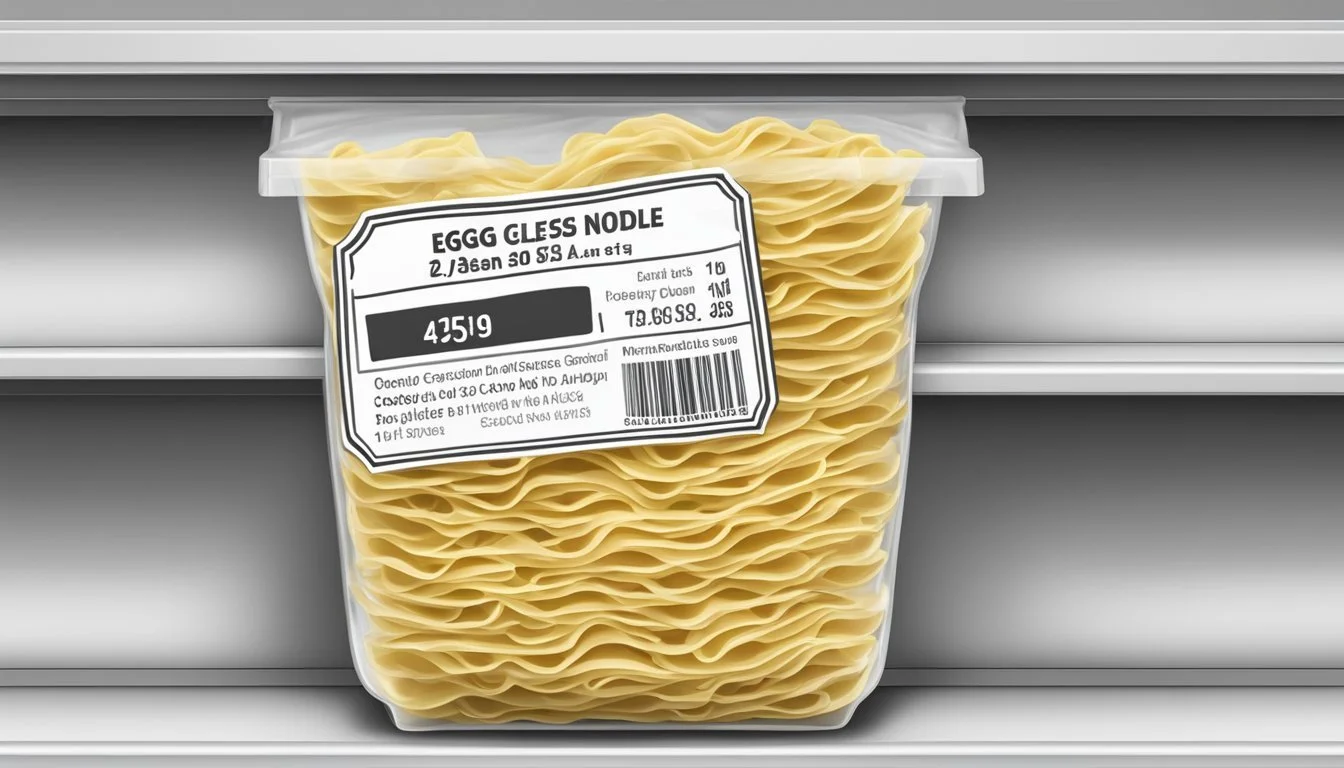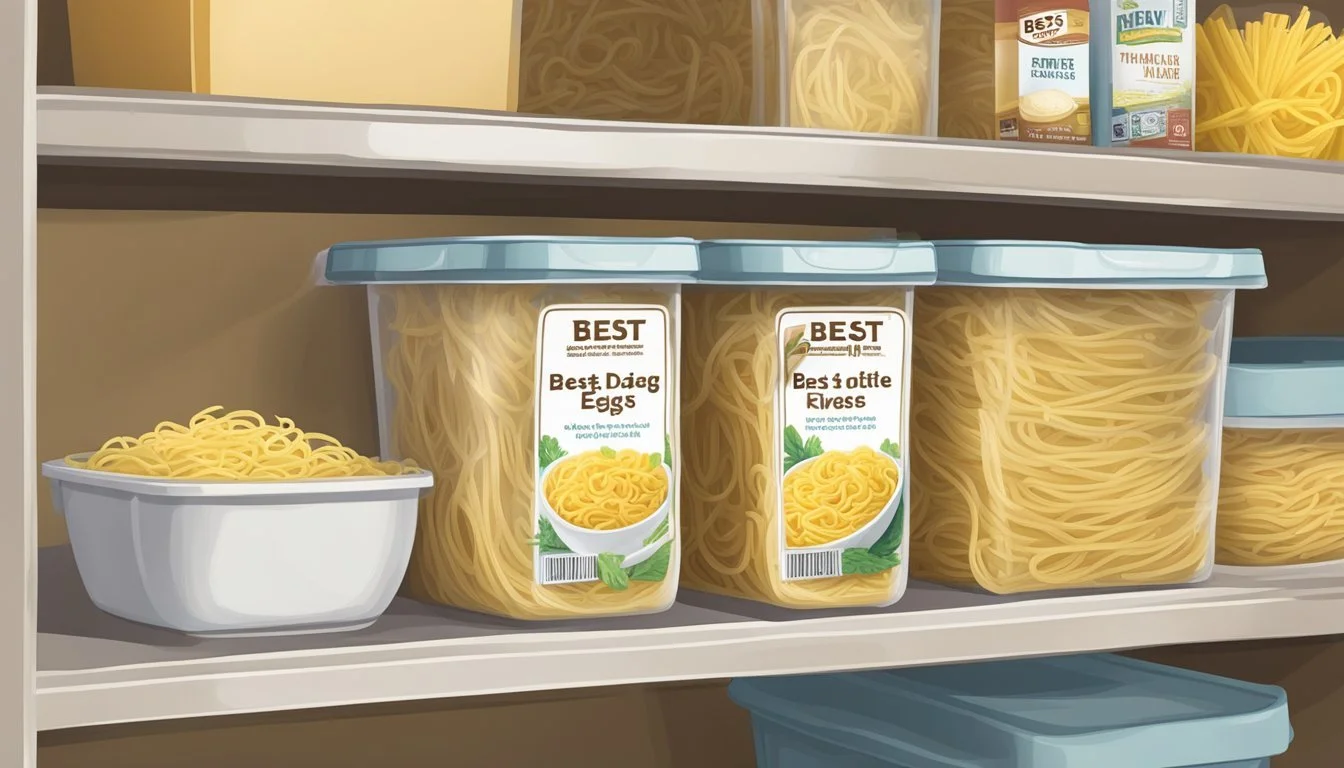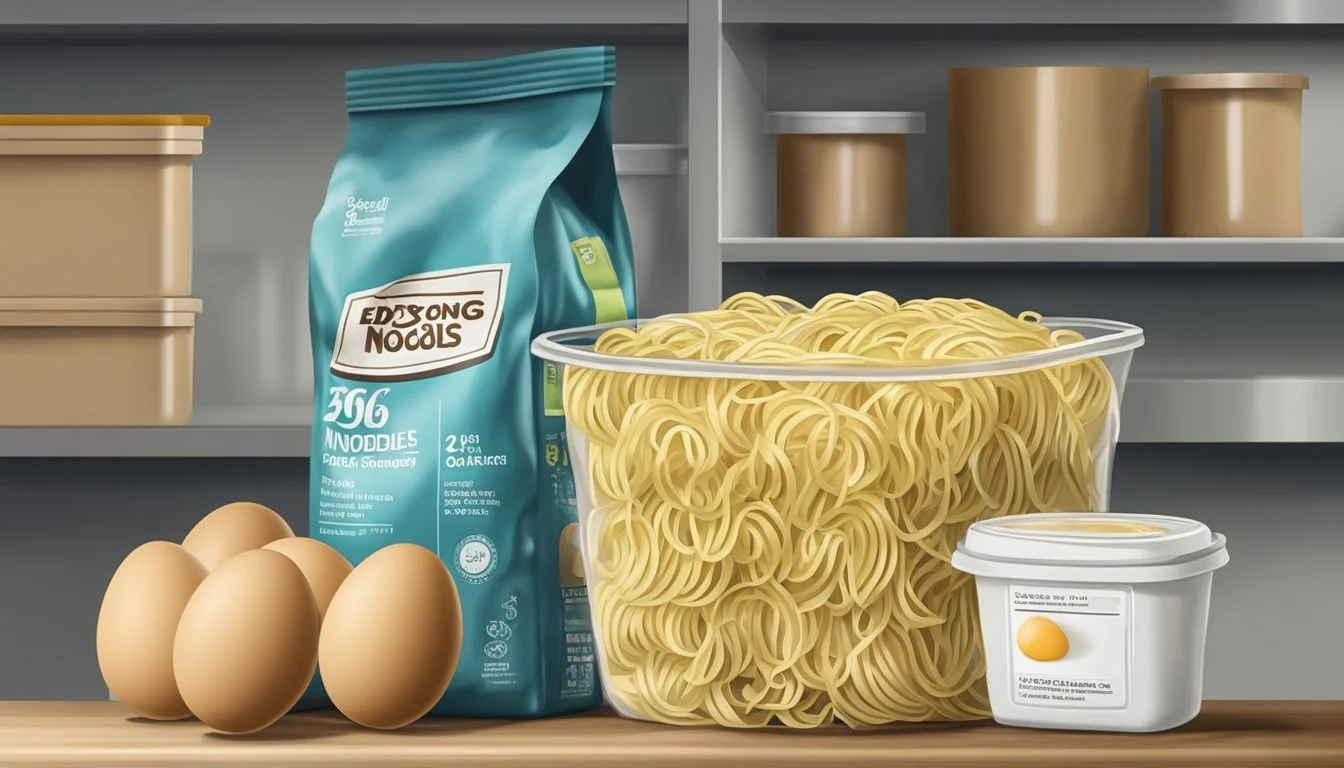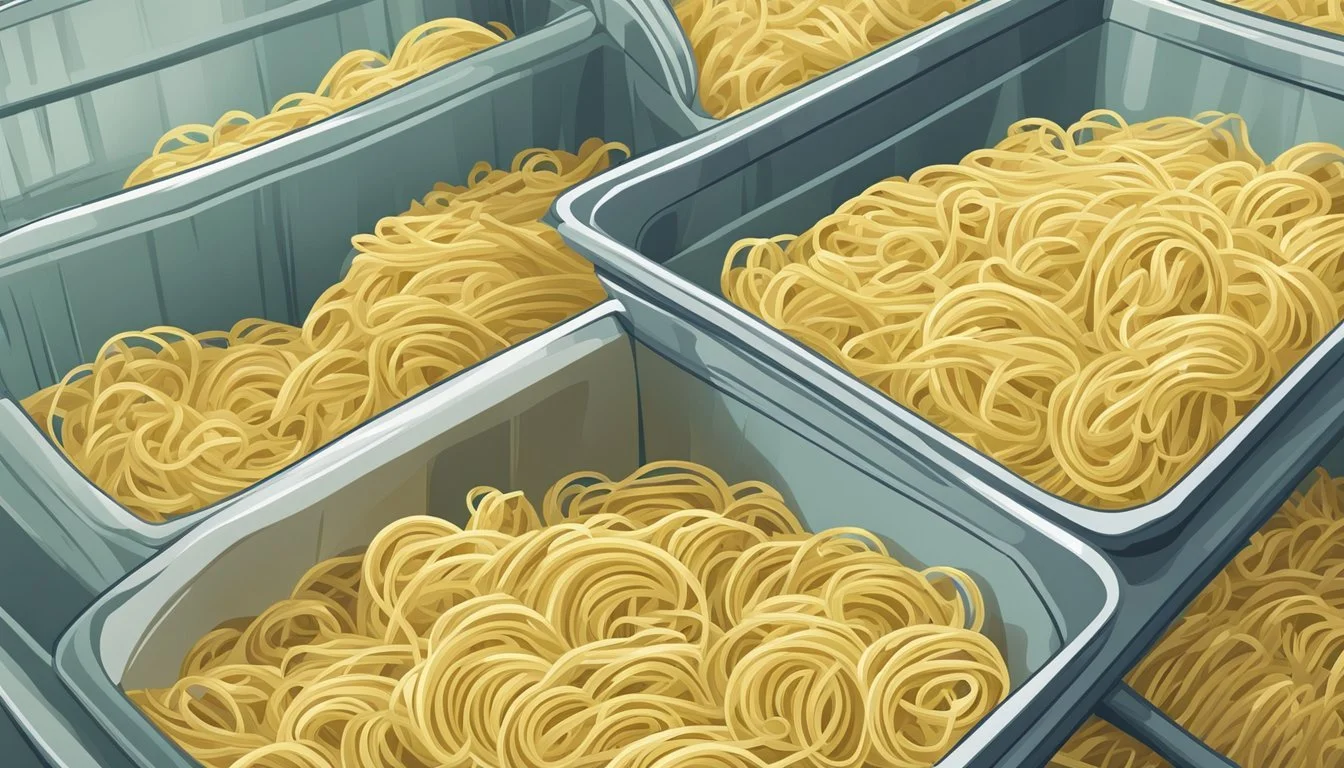Do Egg Noodles Expire?
Understanding Shelf Life and Storage
Egg noodles, a staple in many kitchens, have an essential question that many home cooks ask: Do they expire? Yes, egg noodles do expire, as all food products have a limited shelf life. Properly stored, a package of dry egg noodles can generally maintain its best quality for about two years at room temperature. However, once the package is opened, transferring the noodles to a covered airtight container can further maximize their shelf life.
The quality and taste of egg noodles can significantly decline over time. When stored in optimal conditions, dried noodles can last past their expiration date, but it's crucial to note they will eventually lose flavor and texture. It is advisable to always check for any signs of spoilage or deterioration before using them in your cooking.
Storing egg noodles properly is key to maintaining their quality. Keeping them in a cool, dry place helps prevent them from going bad quickly. For fresh homemade noodles or those with added ingredients like vegetables and herbs, the shelf life is notably shorter, usually lasting about 1-2 days in the refrigerator. This makes proper storage practices essential for both longevity and food safety.
Understanding Egg Noodles
Egg noodles are a popular type of pasta made from flour and eggs, often used in numerous recipes. Depending on their type—fresh or dry—they require different storage methods and have varying shelf lives.
Differences Between Fresh and Dry Egg Noodles
Fresh egg noodles are typically softer and moister compared to their dry counterparts. They are made with flour and eggs and usually contain water, resulting in a shorter shelf life. Fresh egg noodles should be refrigerated and used within a week or two to maintain their quality.
Dry egg noodles, on the other hand, have a longer shelf life due to the drying process, which removes moisture, making them shelf-stable. These noodles can last up to a year when stored in a cool, dry place in an airtight container.
Homemade egg noodles can fall into either category, depending on the drying method used. Properly dried homemade noodles can also last for extended periods, similar to commercially produced dry egg noodles.
Nutritional Value
Egg noodles provide a variety of nutrients, primarily from their key ingredients: flour and eggs. They are a good source of carbohydrates, which supply energy, and contain proteins from the eggs, aiding in muscle repair and growth.
A typical serving of egg noodles (about 1 cup cooked) contains roughly:
Carbohydrates: 40 grams
Protein: 7 grams
Fat: 2 grams
Fiber: 2 grams
Fresh egg noodles tend to have slightly more nutrients due to less processing. Both fresh and dry egg noodles can be part of a balanced diet, but it's essential to pay attention to portion sizes and the overall nutritional content of the dishes in which they are used.
Expiration Date and Food Safety
Egg noodles, like many other food products, come with a marked expiration date. Understanding these labels and the risks associated with consuming expired noodles is crucial for maintaining food safety in the kitchen.
Deciphering Date Labels
When purchasing egg noodles, consumers often encounter various date labels, such as expiration date, best by, and best if used by. These labels provide essential guidance on the product’s shelf life. The USDA notes that the best by date indicates peak quality, while the expiration date refers to the point beyond which the product may no longer be safe to consume.
Fresh egg noodles have a shorter shelf life, typically lasting 1-3 days in the fridge. Dry egg noodles, if properly stored in a cool, dry place, can last up to 2 years. Always check the packaging and store noodles in airtight containers to maximize freshness and safety.
Risks of Consuming Expired Noodles
Consuming expired egg noodles can pose various food safety risks. Over time, the quality degrades, affecting texture, flavor, and nutritional value. More importantly, spoiled noodles may harbor harmful bacteria, leading to foodborne illnesses.
To mitigate these risks, look for signs of spoilage, such as an off smell, discoloration, or mold. Cooking the noodles thoroughly can kill most bacteria, but it may not eliminate all foodborne pathogens. Therefore, it is essential to adhere to date labels and proper storage guidelines to ensure egg noodles remain safe and enjoyable to eat.
Proper Storage Techniques
Maintaining the freshness and extending the shelf life of egg noodles requires the right storage methods. Proper storage involves keeping uncooked and cooked noodles in appropriate containers, using refrigeration and freezing to preserve quality.
Storing Uncooked Egg Noodles
Uncooked egg noodles should be kept in a cool, dry, and dark place. The pantry is often the ideal location. Store them in an airtight container to prevent moisture and pests from getting in.
For long-term storage, consider using Mylar bags with oxygen absorbers. This method can significantly extend shelf life, sometimes up to two years when stored in optimal conditions. Regular monitoring is essential to ensure noodles remain dry and free from contamination.
Storing Cooked Egg Noodles
Cooked egg noodles require prompt refrigeration. Once the noodles cool to room temperature, transfer them to an airtight container to lock in freshness and prevent drying out.
Refrigerated cooked noodles should be consumed within 2-3 days to avoid spoilage. For extended storage, freezing is an option. Place the noodles in a freezer-safe container or bag, removing as much air as possible before sealing. Label with the date and contents to keep track of storage time.
Using Refrigeration and Freezing
Refrigeration helps slow the growth of bacteria in both uncooked and cooked egg noodles. Keep the fridge at a constant temperature of 40°F (4°C) or lower. An airtight container is crucial for minimizing moisture exposure which can lead to mold growth.
For freezing, use freezer bags or airtight containers. Remove as much air as possible before sealing. Label them with the date of freezing for easy tracking. Properly frozen egg noodles can last up to eight months. Thaw them in the refrigerator before use to maintain texture and flavor.
Remember to avoid frequent temperature changes, and always keep the storage area clean and dry to ensure the best quality preservation for your egg noodles.
Identifying Spoiled Egg Noodles
Identifying spoiled egg noodles involves examining their visual appearance, texture, smell, and taste. Spoiled noodles can pose health risks and should be discarded if they show signs of spoilage.
Visual and Textural Changes
Spoiled egg noodles often exhibit noticeable visual and textural changes. A common sign of spoilage is the presence of mold. Mold appears as green, black, or white fuzzy spots on the noodles' surface. If mold is visible, the noodles should be discarded immediately.
These noodles may also become discolored, showing off-colors like grey or dark yellow. Another key indicator is a slimy texture which suggests bacterial growth. Fresh noodles should feel firm and dry, while spoiled ones can feel sticky or mushy to the touch.
Smell and Taste Deterioration
Smell and taste are crucial for identifying spoiled egg noodles. They should not have a rancid odor. Spoiled noodles often emit a sour or rotten smell. If they smell off or different from their usual mild and pleasant aroma, they are likely spoiled.
The taste of egg noodles also deteriorates when they have gone bad. Spoiled noodles might taste sour, bitter, or unusually bland. It's important not to consume noodles with altered taste as they may have harmful bacteria like Salmonella or E. coli, which could lead to food poisoning.
Maximizing the Shelf Life of Egg Noodles
Proper storage can significantly extend the shelf life of egg noodles. For dry, unopened packages, keeping them in a cool and dry place is essential. Fresh or homemade noodles, on the other hand, require more immediate preservation techniques such as refrigeration or freezing.
Tips for Dry and Unopened Packages
Dry egg noodles can last up to two years when stored correctly. Keep the package tightly closed to prevent exposure to air and moisture. A cool, dry place away from direct sunlight is ideal to maintain their best quality.
Using airtight containers can further protect dry noodles once the package is opened. Ensure the containers are kept in a consistent environment to avoid temperature fluctuations that can affect shelf life.
Preserving Fresh or Homemade Noodles
Fresh or homemade egg noodles have a much shorter shelf life, typically 1-2 days if refrigerated. Store them in airtight containers immediately after preparation to avoid exposure to moisture and air.
For more extended preservation, freezing is an effective method. Place the noodles in freezer-safe containers or bags, removing as much air as possible to avoid freezer burn. Labeling with the date helps keep track of how long they’ve been stored. Properly frozen, these noodles can last up to 8 months.
In both cases, ensuring minimal exposure to air, moisture, and fluctuating temperatures is key to maximizing the shelf-life of egg noodles.
Impact of Storage Conditions
Storage conditions play a crucial role in determining the shelf life of egg noodles. Factors such as temperature, humidity, and protection against pests can greatly affect their longevity and quality.
Temperature and Humidity Factors
For dry pasta, maintaining a cool, dry environment is essential. Commercially packaged egg noodles generally last up to two years at room temperature if kept sealed.
Humidity is particularly harmful to pantry staples like dry noodles. Excess moisture can cause the noodles to become soggy or moldy. Store them in an airtight container to avoid exposure to humidity.
Fresh and cooked pasta are more perishable foods. Fresh noodles should be refrigerated and will last 1-2 days, while cooked pasta can last up to five days when stored properly at low temperatures.
Maintaining a consistent temperature in your storage environment helps preserve the nutritional value and texture of the noodles. Fluctuations can accelerate spoilage.
Protecting Against Pests and Contamination
Dry egg noodles are susceptible to pests such as weevils and moths. Storing them in airtight, sealed containers prevents pest infestation, especially in a pantry setting.
For refrigerated or frozen noodles, contamination is a concern. Make sure to use clean containers to store leftover cooked pasta. This helps prevent bacterial growth.
It's also wise to label and date stored noodles to monitor their age and usability. Frozen egg noodles can last up to eight months, but must be thawed completely in the fridge before use to ensure safety and quality.
Troubleshooting Common Issues
Proper storage and handling are essential to maintaining the freshness and safety of egg noodles. This section addresses typical problems such as dealing with opened packages and managing freezer burn.
Handling Opened Bags or Boxes
Once an egg noodle package is opened, exposure to air and moisture can accelerate spoilage.
Proper Storage: Transfer noodles to an airtight container or a zip-top bag immediately. This prevents moisture absorption, which can cause mold and bacterial growth.
Shelf Life: Uncooked noodles last about a year when stored properly in a pantry. If placed in the fridge, they should be used within a few days to ensure freshness.
Signs of Spoilage: Inspect for any unusual texture, off smells, or visible mold before using. If any of these signs are present, it is safer to discard the noodles to avoid foodborne illnesses.
Dealing with Freezer Burn and Thawing
Frozen noodles can develop freezer burn, impacting their quality rather than safety.
Preventing Freezer Burn: Ensure noodles are tightly sealed in a zip-top bag or vacuum-sealed packaging. This minimizes exposure to air, reducing the risk of freezer burn.
Thawing Process: To thaw frozen noodles, transfer them from the freezer to the fridge. This slow thawing method reduces the chance of texture loss and retains the noodles' quality.
Using Thawed Noodles: Use thawed noodles promptly to maintain freshness. If noodles exhibit an unusual texture after thawing, they may have suffered from freezer burn and may not deliver the best culinary results.







